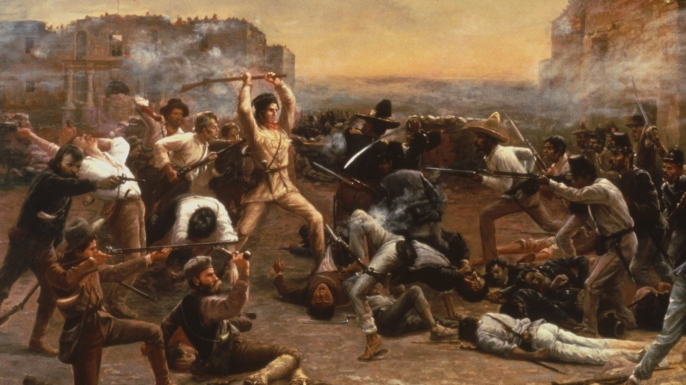William B. Travis, Commander of the Alamo, grew up in Southwest Alabama
Sparta, Alabama

William B Travis, Commander of the Alamo, Grew Up In Alabama
William Barret “Buck” Travis (August 1, 1809 – March 6, 1836) was a 19th-century American lawyer and soldier. At the age of 26, he was a lieutenant colonel in the Texas Army. He died at the Battle of the Alamo during the Texas Revolution. Travis County and Travis Park were named after him for being the commander of the Republic of Texas at the Battle of the Alamo.
Conecuh County Alabama
Travis’s uncle Alexander migrated to the new territory of Alabama following the War of 1812, settling in modern-day Conecuh County. He urged his brother and family to come join him, where he said that the land was cheap and easy to acquire, so Mark took his family, including young William, then age 9, to Alabama. They settled in the newly forming town of Sparta, where Mark Travis purchased the very first certificate from the Sparta Land company. Young Travis grew up in Sparta, Alabama and while his father tended to the farming, his uncle Alexander became prominent, organizing the Old Beulah Church (among other churches), preaching in neighboring counties and nearby Evergreen, Alabama, and leaving a strong influence on young Travis.
The former county seat of Sparta was burned in a federal raid during the Civil War. In 1866, the county seat was moved to Evergreen as it was more centrally located in the county. Evergreen was incorporated as a city on March 28, 1873.
Travis Moved To Claiborne, Alabama
During that same time, Alexander also founded the Sparta Academy and served as its superintendent. Travis received his first formal education at the Sparta Academy, studying subjects ranging from Greek and Latin to history and mathematics. After a few years, Travis moved to the academy of Professor William H. McCurdy in Claiborne, Alabama.
Today, Claiborne is a ghost town on a bluff above the Alabama River near Perdue Hill in Monroe County. Situated near the Federal Road, Claiborne began during the Mississippi Territory period with a ferry that transported settlers across the Alabama River. During the Creek War 1813-1814, a large stockade fort, named Fort Claiborne, was established at the site by General Ferdinand L. Claiborne. He used the fort as a base for the invasion of the Creek nation with the Regular Army of the United States, the Lower Tombigbee Militia, and friendly Choctaw. The community of Claiborne began in 1816, on the former fort site.
Credit: RuralSWAlabama.org
Travis Was A Teacher In Monroe County Alabama
After completing his education at the age of 18, Travis gained a position as an assistant teacher in Monroe County, a position he held for less than a year. He met a student, Rosanna Cato, whom he immediately felt attracted to and with whom he began a romantic relationship.
Wikipedia contributors, “William B. Travis,” Wikipedia, The Free Encyclopedia, https://en.wikipedia.org/w/index.php?title=William_B._Travis&oldid=841758413 (accessed May 28, 2018).
Travis and the Alamo Command

“The enemy has demanded a surrender at discretion, otherwise, the garrison are to be put to the sword if the fort is taken. I have answered the demand with a cannon shot, and our flag still waves proudly from the walls. I shall never surrender or retreat… I am determined to sustain myself as long as possible and die like a soldier who never forgets what is due to his own honor and that of his country. Victory or Death.” – Lt. Col. William B. Travis
In May 1831, upon his arrival in Mexican Texas, a part of northern Mexico at the time, Travis purchased land from Stephen F. Austin, who appointed him counsel from the United States. He set up a law practice in Anahuac and helped start a militia to oppose Mexican rule. He subsequently became a pivotal figure in the Anahuac Disturbances and was imprisoned for his involvement.
Travis was commissioned as a lieutenant colonel of the Legion of Cavalry and became the chief recruiting officer for a new regular Texian army. Governor Henry Smith ordered Travis to raise a company of professional soldiers to reinforce the Texians who were then under the command of James C. Neill at the Alamo Mission in San Antonio. Travis considered disobeying his orders, writing to Smith: “I am willing, nay anxious, to go to the defense of Bexar, but sir, I am unwilling to risk my reputation … by going off into the enemy’s country with such little means, so few men, and with them so badly equipped.” James Bowie arrived at the Alamo with 30 men on January 19, 1836. On February 3, Travis arrived in San Antonio with eighteen regulars as reinforcements. A compromise was reached between Bowie and Travis for command of the Alamo, with Bowie in command of the volunteers and Travis in command of the regulars. When Bowie’s health began to fail the compromise became irrelevant, and Travis became the official commander of the Alamo garrison. On March 6, 1836, following a thirteen-day siege, Santa Anna ordered the assault on the Alamo during the predawn hours. Travis died fighting to the end, and his remains were burned along with all the other Alamo defenders.
Wikipedia contributors, “William B. Travis,” Wikipedia, The Free Encyclopedia, https://en.wikipedia.org/w/index.php?title=William_B._Travis&oldid=841758413 (accessed May 28, 2018).
William B. Travis Home in Purdue Hill Alabama
The home of William B. Travis, Commander of the Alamo was built in around 1820 and stands in Purdue Hill, Alabama
